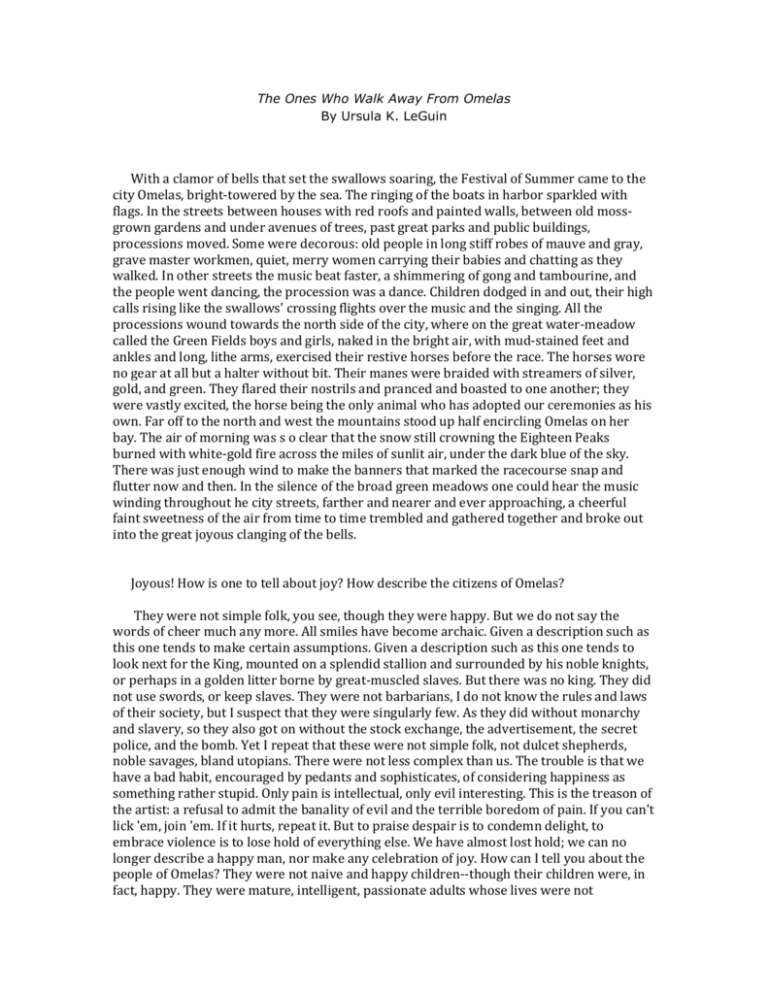

Le Guin knows that, as much as we might enjoy allowing our imagination to run wild, we still do not believe in a place like Omelas: “Do you believe? Do you accept the festival, the city, the joy? No? Then let me describe one more thing.” What Le Guin starts to describe is horrific: She follows this up, again anticipating any objection, with this: “let the offspring of these delightful rituals be beloved and looked after by all.” Let us not, however, have temples from which issue beautiful nude priests and priestesses already half in ecstasy and ready to copulate with any man or woman, lover or stranger, who desires union with the deep godhead of the blood, although that was my first idea. I fear that Omelas so far strikes some of you as goody-goody. If we still don’t think this is interesting, she affords us the latitude to imagine, well, just look: This is the treason of the artist: a refusal to admit the banality of evil and the terrible boredom of pain. Only pain is intellectual, only evil interesting. The trouble is that we have a bad habit, encouraged by pedants and sophisticates, of considering happiness as something rather stupid. If we think such place uninteresting, she castigates us:

Perhaps it would be best if you imagined it as your own fancy bids, assuming it will rise to the occasion, for certainly I cannot suit you all. Omelas sounds in my words like a city in a fairy tale, long ago and far away, once upon a time. O miracle! But I wish I could describe it better. They were mature, intelligent, passionate adults whose live were not wretched. How can I tell you about the people of Omelas? They were not naive and happy children - though their children were, in fact, happy. Obviously, this is a true utopia, meaning it is “no place.” This place does not exist in reality, and even Le Guin acknowledges this, asking us instead to use our imagination to create this place and try to knock off as many of the things that we think might make such a place actually undesirable. Somehow these people are able to govern themselves and maintain peace and mutual prosperity. They were not less complex than us.” She assures us there are no kings, no slaves, no hierarchies whatsoever. Le Guin assures us that “these were not simple folk, not dulcet shepherds, noble savages, bland utopians. After all, when we see depictions of some paradisaical utopia, it often looks like it’s that way because the citizens are “innocent,” which really means ignorant and simple. And for the first several paragraphs Le Guin tries to head off any suspicions a reader may harbor. With a clamor of bells that set the swallows soaring, the Festival of Summer came to the city of Omelas, bright-towered by the sea.

Omelas is presented to us as the pinnacle of civilization, and in the first paragraph we get to enter it on a special day: In December her most recent work, a collection of essays called No Time to Spare: Thinking About What Matters, was published.įor those of you who have not read it (and especially for those of you who have not read anything by Le Guin), “The Ones Who Walk Away from Omelas” is a showcase of her gifts, packed into just a few pages. And she did it, filled with energy, until the end. Her works are complex philosophical and beautifully imagined explorations of, among other things, society and gender and identity. She was a tremendous writer, unafraid to be subversive and confident that she was writing important fiction even if many in the literary community checked her off as “merely” a fantasy or science fiction author. Le Guin died last month at the age of 88. Le Guin’s very short, thought-provoking, and perhaps too easily simplified and reduced to a moral (albeit an important one) “The Ones Who Walk Away from Omelas.” Flannery O’Connor’s “A Good Man Is Hard to Find” and William Trevor’s “The Piano Tuner’s Wives,” two of my absolute favorites, are up against each other in the first round! Who put this thing together? Due to forces I couldn’t control, another favorite is also in that bracket, meaning that at best only one of my favorites can make it to the final four. I have already written about a few of the contenders that are personal favorites.

Mookse Madness: Short Stories begins next week! You can see the brackets and the schedule here.


 0 kommentar(er)
0 kommentar(er)
